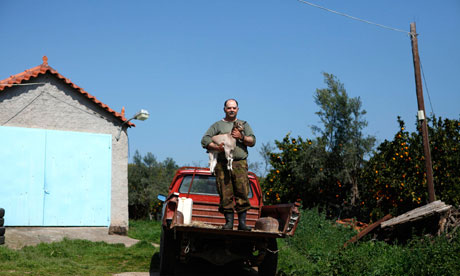Moving to the Greek countryside from the city, though (see last post) is no picnic.
 Photograph: Cathal Mcnaughton/Reuters
Photograph: Cathal Mcnaughton/ReutersThis picture shows 56-year-old farmer George Andrianakis, and goat, at his farm in the village of Stafania in the Peloponesse area of Greece. As he told Reuters, profits at the farm (which includes orange and olive trees, sheep and goats) are down by over 50% this year while costs are almost 30% higher.
News in from Athens, where our correspondent Helena Smithsays newspapers and television channels this morning all reporting that young Greeks hit hard by the financial crisis are fleeing from the cities to the countryside.
Some commentators are describing it as a mass exodus. Helena writes:
Another story in the NY Times (Jan. 9 2012) confirms this trend in Greece.It's official: Greece is undergoing a mass internal migration as a result of the economic crisis that has engulfed the nation since December 2009.
After years of being spurned for the bright lights of big cities, rural areas are making a comeback as unprecedented numbers of unemployed young Greeks move en masse to the countryside encouraged by government stipends to cultivate tracts of land that have been left untended for years. A survey conducted at the behest of the Agricultural Development Ministry by the polling firm Kapa Research found that more than 1.5 million Greeks were considering relocating to rural areas with one in five already having made the move. Around 75 % were under the age of 44 – the group worst hit by joblessness in a nation where more are now out of work than employed.
A €60bn state-funded program offering plots of land at cheap rates to would-be farmers had been snapped up, said the agriculture minister Costas Skandalides, announcing the findings. The survey showed that the vast majority were willing to earn less for a better quality of life. "More than one million Greeks, most with university and even post graduate degrees, are rejecting prototypes to go back to their roots convinced that it will lead to a better quality of life even if there are less trappings," he averred. "We are witnessing a profound shift in Greek society and lifestyles the extent to which we have yet to grasp."
In the northern Greek city of Thessaloniki, more than 4,000 trained agronomists have rushed to sign up to an initiate that has seen the town's main university rent out plots of land for cultivation at affordable prices. "I will go and grow rice and cotton," Alexandra Terzidou, one of the graduates, told Skai news. "It's a great opportunity."
Prior to the research academics had poured over anecdotal evidence of the migration but had been unable to pin point just how big it was.
WASHINGTON — Stung by high gasoline costs, outlying suburbs that sprouted in the heady 2000s are now seeing their growth fizzle to historic lows, halting American city dwellers’ decades-long exodus to sprawling homes in distant towns.
New census estimates as of July 2011 highlight a shift in population trends following an extended housing bust and renewed spike in oil prices. Two years after the recession technically ended, and despite faint signs of a rebound, Americans again are shunning moves at record levels and staying put in big cities.
That is posing longer-term consequences for residential “exurbs” on the edge of metropolitan areas.
Construction of gleaming new schools and mega-malls built in anticipation of a continued population boom is cutting back. Spacious McMansions offering the promise of homeownership to middle-class families sit abandoned or half-built. Once an escape from urban problems, suburban regions hit by foreclosures are posting bigger jumps in poverty than cities.
The result: The annual rate of growth in American cities and surrounding urban areas has now surpassed that of exurbs for the first time in at least 20 years, spanning the modern era of sprawling suburban development.
Read more: http://www.nydailynews.com/news/national/census-shows-u-s-cities-booming-suburbs-wilting-article-1.1056505#ixzz1rZUkArFp


